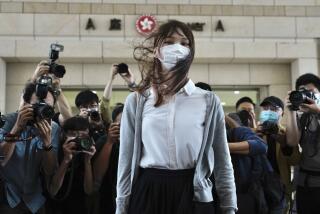Oldest Hong Kong Emigrant to Leave for Canada : Asia: At 100, after rearing eight children and surviving the Japanese occupation, she can’t face a takeover by the Chinese.
- Share via
HONG KONG — Maria Venus Rozario has faced hunger and Japanese invaders during 100 years in Hong Kong. After her husband died when she was 33, she hacked a living for their eight children from this jungle of free enterprise.
Now, Rozario is leaving, lonely for the children already gone and fearful of China’s Communist government, which takes over the British colony in 1997.
When she steps onto the plane for Vancouver, Canada, the frail but spry great-grandmother will become the oldest emigrant in a mass exodus from Hong Kong.
The government says 62,000 of Hong Kong’s 5.7 million people will leave this year, but other estimates put the number closer to 80,000. Most emigrants are professionals in their 30s and 40s, but growing numbers of old people are joining them.
Hong Kong’s elderly, left behind by their emigrating children, often have the bitter choice of dying alone or leaving home.
“It’s not too much to ask to be with one’s family, is it?” Rozario said, fingering a tattered family photograph. “But I will also miss Hong Kong. My whole life is here with all my memories.”
Rozario, who plans to leave this month, has a daughter in British Columbia and a son in San Francisco.
Her home in Hong Kong is a small apartment in a run-down tenement in the teeming Kowloon section.
Downstairs are the Steamy Steam Baths and the Chinese Happy Tattoo House. Upstairs, in Rozario’s apartment, are fresh flowers and a small collection of butterflies.
Maria Venus Gomes da Silva was born into a family of sailors from the Portuguese colony of Macao, 45 miles south of Hong Kong on the southern Chinese coast.
Her father moved to Hong Kong, where he married and started a family. Maria went to work at 14, teaching English grammar to the daughters of British soldiers stationed in the territory.
She left the school in 1913 to marry a Portuguese businessman, and her first child was born in 1915.
His death of a heart attack in 1923 left Rozario alone with eight children. She never remarried and supported the children by working two jobs at once, sometimes three, as secretary, clerk and accountant.
“You don’t know how hard hunger is to take, especially when it’s your children who are hungry,” she said.
Then came Japan’s brutal occupation during World War II.
One day, Japanese troops lined up a group of young men on a boulevard by Hong Kong’s harbor. A Japanese policeman moved along the rank, chopping off their heads with a sword.
One of Rozario’s sons, Marcos, was last in line. He had been arrested for resisting the occupation.
“I ran through the crowd and pleaded with the man to save my boy,” she said. “He gave in.”
At the end of the war, Rozario collected Marcos from jail. He was tortured and broken by the Japanese and still lives with his mother, unable to work.
Rozario said she hopes to take Marcos to Canada, “but if we cannot get the visa, then he will stay here. This is what has become of my family.”
After the war, her other children left Hong Kong one by one, attracted by better job prospects or propelled by fear of the Communists in China.
“The family all wanted to stay,” she said, “but it was the insecurity about Hong Kong that made them leave. How can we live in peace here with the Chinese ready to grab us back?”
Soon after China’s bloody crackdown on the pro-democracy movement in Beijing last year, Rozario also decided to go.
“Just like in the Bible, it’s really an exodus,” she said. “I’m just a little drop of water in all this.”
More to Read
Sign up for Essential California
The most important California stories and recommendations in your inbox every morning.
You may occasionally receive promotional content from the Los Angeles Times.













